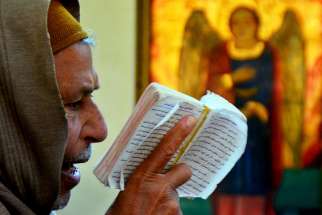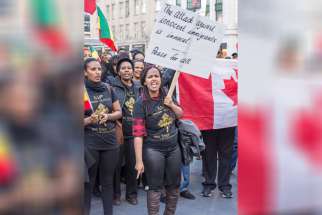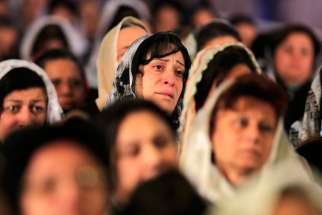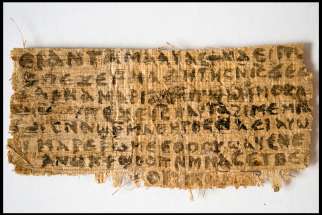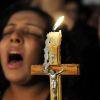OXFORD, England - Egypt's Catholic Church has pledged respect for the country's justice authorities after a deposed Islamist president was sentenced to death for alleged complicity in a planned jail break.
Toronto's Ethiopians rally against Islamic State brutality
TORONTO - Close to 1,000 Ethiopian immigrants — a mix of Orthodox, Protestant and Muslim — gathered in the late afternoon and evening of April 28 in Dundas Square to mourn together the death of two Ethiopian migrant workers murdered April 19 in Libya by Islamic State militants.
21 slain Egyptian Copt martyrs had their cross to bear
MONTREAL - Christians have always faced various degrees of persecution through the centuries and should always be prepared to wear “the crown of martyrdom,” a Coptic leader in Montreal told his congregation Feb. 28 during a memorial Mass honouring 21 Egyptians who were beheaded on a beach in Libya by jihadists in mid-February.
Easter ‘news’ follows a predictable pattern
Earlier this month, the international wire services carried a story involving a fragment of papyrus written in Coptic that suggested Jesus may have referred to “my wife” in speaking to a group of followers.
Pope Benedict hopes new Coptic leader can help foster peace in Egypt
VATICAN CITY - Pope Benedict XVI praised the choice of the new patriarch of the Coptic Orthodox Church, saying he was confident the new leader would help build a new Egypt that would serve the common good of the nation and the whole Middle East.
Bishop Tawadros, 60, was chosen Nov. 4 to lead Egypt's Coptic Orthodox Church, the largest Christian community in the country. He will be ordained Nov. 18 as Pope Tawadros II of Alexandria and patriarch of the See of St. Mark.
Pope Benedict said in a telegram to the new pope that he was "filled with joy" upon learning of the news and extended his "good wishes and prayerful solidarity."
"I am confident that, like your renowned predecessor, Pope Shenouda III, you will be a genuine spiritual father for your people and an effective partner with all your fellow-citizens in building the new Egypt in peace and harmony, serving the common good and the good of the entire Middle East," Pope Benedict wrote.
"In these challenging times it is important for all Christians to bear witness to the love and fellowship that binds them together," mindful of God's call for Christian unity, the Pope said.
Pope Benedict noted the "important progress" in ecumenical relations that was made under the guidance of the late Pope Shenouda, who died in March at age 88 after leading the Church for four decades.
More than 2,400 bishops and elite lay leaders voted to reduce a five-person short list to three nominees for a new pope. Bishop Tawadros' name was drawn from a glass bowl by a blindfolded child in a traditional ceremony held at Cairo's St. Mark's Cathedral; the Coptic Orthodox Church says the process lets "the hand of God" make the final choice.
Bishop Tawadros, whose birthday fell on the day of his selection, is bishop of Beheira. He studied pharmaceutical sciences at Alexandria University and reportedly ran a medicine factory before taking his vows.
"He is young — 60 is not so old — and he is well-educated," Fr. Rafic Grieche, spokesman for the Egyptian Catholic bishops' conference, told Catholic News Service. "He can make interior changes to his Church and at the same time be open to other churches and to the country's Muslims."
But the new pope will face a raft of challenges, with political debate in Egypt over how prominent a role Islamic law should play in the country's long-awaited constitution. His reaction to incidents of sectarian violence, which peaked in the months following Egypt's early 2011 uprising that ousted former President Hosni Mubarak, will also be key.
Michael Meunier, president of the U.S. Copts Association, was one of the laymen who participated in the complex election process. He told Vatican Radio Nov. 4 that people saw in Bishop Tawadros a man "who could unite Egypt's Christians in these very difficult times, a man of dialogue."
Dialogue and reconciliation with other Christian churches are critical, Meunier said, "because we are faced with many other challenges from hardliners" and extremist elements in the Muslim community.
"On a whole there is no future for Christians in Egypt without dialogue with Muslims. We have to engage moderate Muslims in the political fight that we face in Egypt, for example the new constitution being drafted; there are a lot of fanatic elements in society and they are going after moderate Muslims, they are going after women and they are going after Christians," he said.
"It is important to have a pope who believes in dialogue with Muslims because it's the only way to help promote democracy, religious freedom, human rights and respect for all these values that we hope for," Meunier said.
Bishop Tawadros will have to win back the support of many Coptic youth, suspicious of the Church's involvement in politics during the Mubarak era. At the height of the 2011 uprising, Pope Shenouda implored Coptic Christians to remain at home, solidifying the Church's reputation for unquestioned loyalty to the state.
Speaking to television cameras at a monastery after his election, Bishop Tawadros suggested he might revise the explicitly political role the Church held under Pope Shenouda's leadership.
"The most important thing is for the Church to return and live consistently within its spiritual boundaries because this is its main work, spiritual work," he said, pledging to "rearrange the house from the inside."
Activists welcomed the new approach, but voiced skepticism over how easy it would be to achieve, given the increasingly important role of religion in Egypt's political discourse. Islamists won more than two-thirds of the seats in the country's last Parliament — dissolved in June — and President Mohammed Morsi is from the Islamist Muslim Brotherhood.
"It will be very difficult to get himself out of the political arena, when the (Muslim Brotherhood) mixes religion with politics," said Mina Thabet, a 23-year-old Coptic rights activist. "But I think he should."
"It has to change," said Grieche, referring to the days when the Church would back candidates from Mubarak's party in parliamentary elections.


